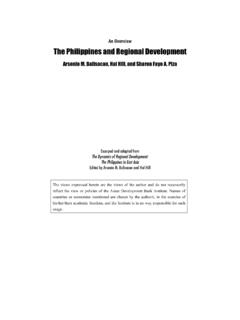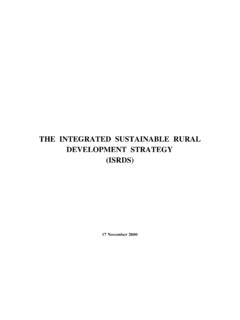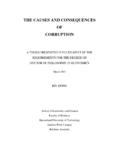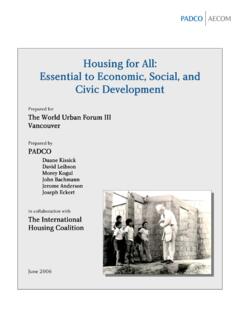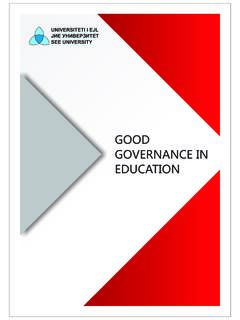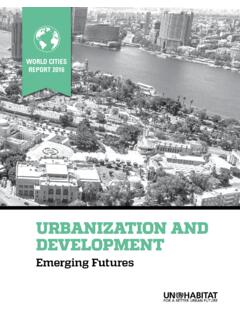Transcription of The Basic Education Core Curriculum B.E. 2551 (A.D. 2008)
1 The Basic Education Core Curriculum 2551 ( 2008) The Ministry of Education Thailand Preface As far back as 2002, the Ministry of Education announced experimental application of the Basic Education Curriculum 2001 in its pilot and network schools. Mandatory implementation was subsequently effected in all schools providing Basic Education from academic year 2003 to the present time. Various agencies with direct responsibilities, as well as those concerned, have continuously followed up and evaluated the application. Different strengths identified have proved to be quite gratifying. In fact, the application has been found to facilitate decentralization of educational authority, enabling local communities and educational institutions to participate and make significant contributions to preparation of curriculums that met their real needs.
2 Clear concepts and principles for promoting learners' holistic development were quite apparent. Nonetheless, the outcomes of the studies revealed several problems and issues of concern arising from shortcomings of the 2001 Curriculum . Problems and issues of concern included the Curriculum 's its provisions, application process and results. Among the problems identified were confusion and uncertainty faced by practitioners in educational institutions in preparing school curriculums; the majority of schools were ambitious in prescribing learning contents and expected outcomes; measurement and evaluation did not correlate with the standards set, with negative effects on certification and transfer of learning achievements. Furthermore, issues of learners' quality resulting from acquisition of essential knowledge, skills, capacity and desirable characteristics and attributes were quite disconcerting.
3 Consequently, the Office of the Basic Education Commission (OBEC), under close supervision and wise guidance of the Basic Education Commission, took necessary measures to revise the Basic Education Curriculum 2001 in order to prepare the subsequent Basic Education Core Curriculum 2008. In so doing, OBEC availed of the outcomes of the studies undertaken and benefited from the data and information provided in the Tenth National Economic and Social Development Plan (2007-2011). Pertinent research results and projections led to greater clarity regarding the goals of improving learners' quality and Curriculum application at school and educational service area levels. Succinct information is presented regarding the vision, goals, learners' significant capacities, desirable characteristics and attributes, learning standards and relevant indicators, allotted time to each subject area for each grade level, and evaluation criteria that correlate with learning standards and consequently facilitate Curriculum implementation.
4 All these measures were aimed at providing schools with desirable orientation and guidance for preparation of the Curriculum required for each level of Education . The Basic Education Core Curriculum 2008 also allows opportunities for further amplification in accord with the schools' priorities and readiness. The Basic Education Core Curriculum 2008 thus prepared will undoubtedly provide all educational service area offices, local offices and Basic Education institutions under jurisdiction of various agencies with an appropriate framework and guidance for preparing the pertinent Curriculum . The Basic Education to be provided to all Thai children and youths will be of higher quality in regard to acquisition of essential knowledge and skills required for learners' lives in the constantly changing society.
5 Learners will also be able to acquire knowledge for continuous lifelong self-development. On behalf of the Basic Education Commission, may I express my thanks and appreciation for the active participation and contributions of all agencies concerned of both the Ministry of Education and other state offices, the private sector, people of all walks of life and parents and students. Their concerted efforts have led to successful completion of this policy document, which, I trust, will henceforth be most beneficial to educational provision for the Thai people. Chai-anan Samudvanijja (Mr. Chai-anan Samudvanijja). Chairman of the Basic Education Commission Directive of the Ministry of Education No. OBEC 293/2551 (2008). Subject: Implementation of the Basic Education Core Curriculum 2551 ( 2008). ----------------------- Rapid economic and social change together with scientific and technological advancement have made it imperative for adaptation of Basic Education provision, which must be harmonized with such change and progress.
6 Innovative strategies must be identified to improve the quality of Education , which necessarily serves the needs of individuals as well as those of Thai society. Learners' capacities for competitiveness and creative cooperation will strengthen Thailand's international competitive position. There are also urgent needs for inculcation of awareness of Thai-ness, self-discipline, concern for public interest and adherence to a democratic form of government under constitutional monarchy as stipulated in Section 80 of the Constitution of the Kingdom of Thailand 2007. and the National Education Act 1999 and Amendments 2002 (Second National Education Act). By virtue of Sections 12 and 15 of the Administrative Organization of the Ministry of Education Act 2003 as well as approval of the Basic Education Commission for application of the Basic Education Core Curriculum 2008, the Ministry of Education hereby authorizes implementation of the Curriculum , the provisions of which are appended to this directive.
7 The Basic Education Core Curriculum 2008 shall replace the Basic Education Curriculum 2001. Conditions and time frame for application of the Basic Education Core Curriculum 2008 shall be as follow: 1. For model schools for Curriculum implementation and those ready for such implementation, the names of which have been announced by the Ministry of Education : (1) For academic year 2009, the Basic Education Core Curriculum 2008. shall be applied for Grades 1-6 and Grades 7 and 10;. (2) For academic year 2010, the Basic Education Core Curriculum 2008. shall be applied for Grades 1-6, and Grades 7, 8, 10 and 11; and (3) As of academic year 2011, the Basic Education Core Curriculum 2008. shall be applied for all grades. 2. For schools in general: (1) For academic year 2010, the Basic Education Core Curriculum 2008.
8 Shall be applied for Grades 1-6 and Grades 7 and 10;. (2) For academic year 2011, the Basic Education Curriculum 2008 shall be applied for Grades 1-6 and Grades 7, 8, 10 and 11; and (3) As of academic year 2012, the Basic Education Core Curriculum 2008. shall be applied for all grades. With prior approval of the Basic Education Commission, the Secretary-General of the Basic Education Commission is hereby authorized to make annulment, augmentation and change to the Basic Education Core Curriculum 2008 in accord with exigencies of the target groups and methods of educational provision. Given on July 11, 2008. Somchai Wongsawat (Mr. Somchai Wongsawat). Minister of Education Contents Page Preface Directive of the Ministry of Education No. OBEC 293/2551. Subject: Implementation of the Basic Education Core Curriculum 2008.
9 Background 1. Vision 4. Principles 4. Goals 5. Learners' Key Competencies 6. Desirable Characteristics 7. Learning Standards 7. Indicators 8. Learning Areas 10. Relationships in the Development of Learners' Quality According to the Basic 11. Education Core Curriculum Strands and Learning Standards 12. Learner Development Activities 22. Educational Levels 23. Learning Time Allotment 24. Learning Time Structure 25. Educational Provision for Special Target Groups 26. Learning Management 27. Learning Media 29. Learning Assessment 31. Criteria for Learning Assessment 34. Documents Showing Evidence of Education 38. Transfer of Learning Outcomes 39. Contents (cont.). Page Curriculum Implementation and Management 40. Learning Standards and Indicators 42. Thai Language 42. Mathematics 64. Science 106. Social Studies, Religion and Culture 151.
10 Health and Physical Education 187. Arts 212. Occupations and Technology 238. Foreign Languages 252. References 280. 1. Background The Ministry of Education announced implementation of the Basic Education Curriculum 2001, which served as the core Curriculum for national Education at the Basic level. The Curriculum prescribed goals and learning standards. It also provided a framework and orientation for enhancing quality of life of learners, who would attain virtue, wisdom, as well as capacity to maintain Thailand's competitive position in the world community (Ministry of Education , 2001). At the same time, the Curriculum was duly adjusted for harmonisation with the objectives of the National Education Act 1999 and amendments made in 2002 (Second National Education Act). These laws have placed emphasis on decentralisation of educational authority to local communities and schools, which are to play significant roles and actively participate in preparing curriculums suitable to actual situations and serving their real needs (Office of the Prime Minister, 1999).
